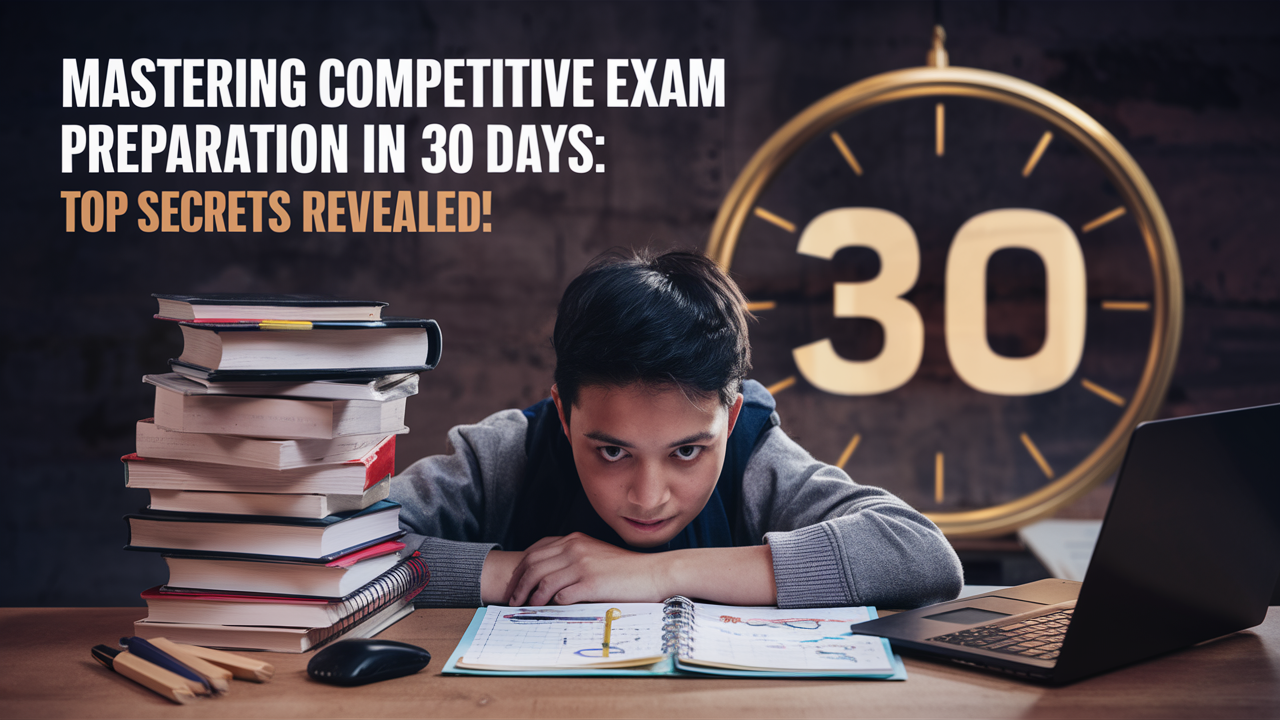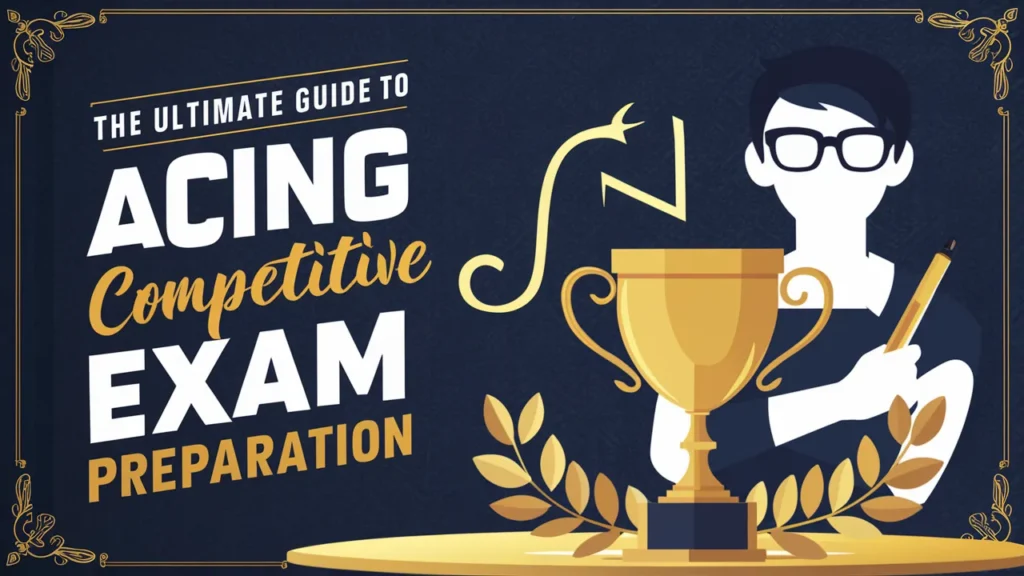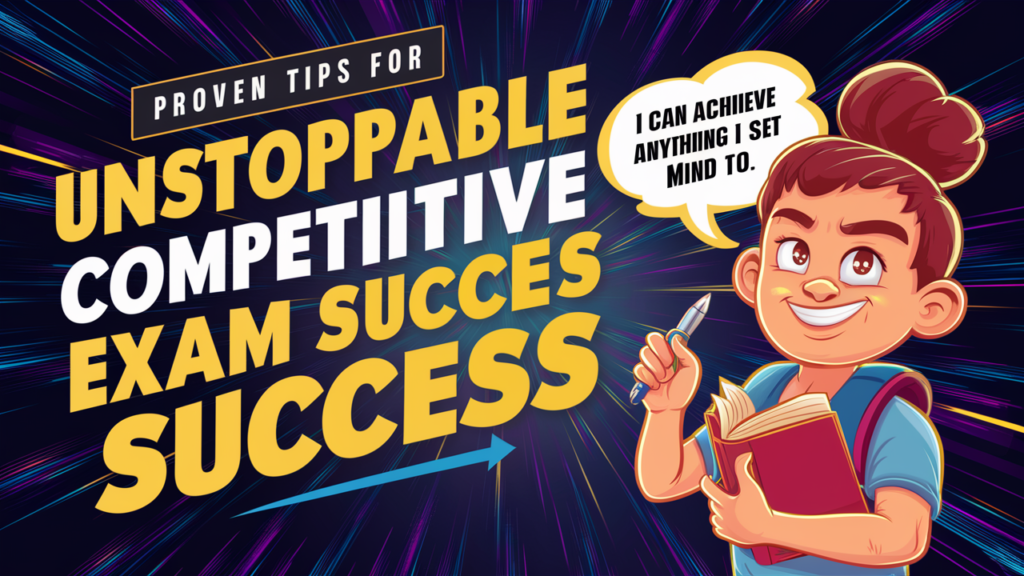
Mastering Competitive Exam Preparation
Preparing for competitive exams can be a daunting task, especially when you have limited time. However, with a focused approach and effective strategies, you can make the most of the 30 days you have. In this blog, we’ll explore practical tips and techniques to help you master your competitive exam preparation within a month. By following these guidelines, you can enhance your study efficiency, retain more information, and feel confident on exam day.
1. Understand the Exam Pattern and Syllabus
Before you start studying, it’s crucial to understand the exam pattern and syllabus thoroughly. Knowing what to expect can help you focus on the most important topics and avoid wasting time on irrelevant material.
Key Steps:
- Research the Exam: Learn about the exam format, types of questions, marking scheme, and time duration.
- Get the Syllabus: Obtain the official syllabus from the exam conducting body’s website.
- Identify Key Topics: Highlight the most important topics based on past exam trends and weightage.
2. Create a Realistic Study Plan
A well-structured study plan is essential for effective exam preparation, especially when time is limited.
Key Steps:
- Break Down the Syllabus: Divide the syllabus into manageable chunks that can be covered in 30 days.
- Allocate Time Wisely: Dedicate more time to subjects or topics you find challenging.
- Set Daily Goals: Establish clear, achievable goals for each day to keep yourself on track.
- Include Revision Time: Schedule regular revision sessions to reinforce what you’ve learned.
3. Focus on High-Yield Topics
With limited time, it’s crucial to prioritize high-yield topics that are more likely to appear on the exam.
Key Steps:
- Review Past Papers: Analyze previous years’ question papers to identify frequently asked questions and important topics.
- Prioritize Topics: Focus on areas that carry the most weight and are often tested.
- Create Summary Notes: Make concise notes of key concepts, formulas, and important points for quick review.
4. Use Effective Study Techniques
Employing effective study techniques can enhance your learning and retention, making your study sessions more productive.
Key Techniques:
- Active Learning: Engage with the material through discussions, teaching others, or applying concepts to real-life scenarios.
- Pomodoro Technique: Study in focused intervals (e.g., 25 minutes) followed by short breaks to maintain concentration and avoid burnout.
- Spaced Repetition: Review information at increasing intervals to improve long-term retention.
- Practice Tests: Take mock tests under exam conditions to build familiarity and reduce exam anxiety.
5. Leverage Online Resources
The internet is a treasure trove of study materials, tutorials, and practice tests that can supplement your preparation.
Key Resources:
- Educational Websites: Utilize platforms like Khan Academy, Coursera, and edX for free courses and tutorials.
- YouTube Channels: Follow educational YouTube channels that offer lectures, tips, and explanations on various topics.
- Mobile Apps: Use apps like Quizlet, Anki, and Evernote to organize your study materials and practice on the go.
6. Stay Healthy and Manage Stress
Maintaining your physical and mental well-being is crucial for optimal performance during your preparation period.
Key Steps:
- Balanced Diet: Eat nutritious foods to keep your energy levels up.
- Regular Exercise: Engage in physical activity to reduce stress and improve concentration.
- Adequate Sleep: Ensure you get 7-8 hours of sleep each night to support cognitive function and memory.
- Mindfulness Practices: Practice meditation, deep breathing, or yoga to manage stress and stay calm.
7. Join a Study Group
Collaborating with others can provide support, motivation, and diverse perspectives on challenging topics.
Key Steps:
- Form a Group: Join or create a study group with peers who are also preparing for the same exam.
- Set Group Goals: Establish common goals and a study schedule for group sessions.
- Share Resources: Exchange notes, practice questions, and insights to enhance each other’s understanding.
- Discuss and Teach: Explain concepts to each other to reinforce learning and identify any gaps in knowledge.
8. Regularly Assess Your Progress
Regular self-assessment helps you stay on track and adjust your study plan as needed.
Key Steps:
- Weekly Reviews: Assess your progress at the end of each week to ensure you’re meeting your goals.
- Mock Tests: Take full-length mock tests to simulate exam conditions and evaluate your readiness.
- Identify Weak Areas: Focus on areas where you scored low and revise those topics more thoroughly.
- Adjust Your Plan: Modify your study plan based on your progress and the areas that need more attention.
9. Avoid Procrastination and Stay Disciplined
Staying disciplined and avoiding procrastination are key to making the most of your 30-day preparation period.
Key Steps:
- Eliminate Distractions: Identify and minimize distractions in your study environment.
- Stick to Your Schedule: Follow your study plan diligently and avoid unnecessary deviations.
- Stay Accountable: Share your goals and progress with a friend or family member who can help keep you accountable.
- Reward Yourself: Celebrate small victories to stay motivated and maintain a positive attitude.
10. Stay Positive and Confident
A positive mindset and confidence can significantly impact your performance on the exam day.
Key Steps:
- Positive Affirmations: Use affirmations to boost your confidence and reduce anxiety.
- Visualize Success: Spend a few minutes each day visualizing yourself performing well on the exam.
- Stay Motivated: Remind yourself of your goals and the reasons you want to succeed.
- Seek Support: Talk to friends, family, or a mentor for encouragement and support.
Conclusion
Mastering competitive exam preparation in 30 days is challenging but achievable with the right strategies and mindset. By understanding the exam pattern, creating a realistic study plan, focusing on high-yield topics, using effective study techniques, leveraging online resources, staying healthy, joining a study group, regularly assessing your progress, avoiding procrastination, and maintaining a positive attitude, you can maximize your chances of success.
Remember, the key to effective preparation is consistency and determination. Stay focused, stay disciplined, and believe in your ability to achieve your goals. Good luck with your exam preparation!
By following these secrets to mastering competitive exam preparation in 30 days, you’ll be well on your way to achieving success and reaching your academic goals. Stay motivated, stay positive, and give it your best effort!


